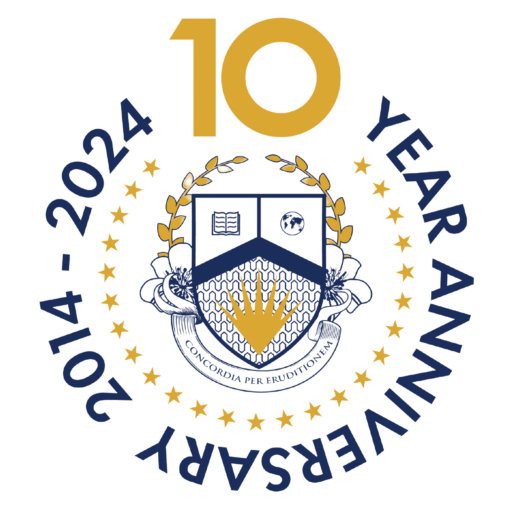Bylaws
BY-LAWS OF BAY ATLANTIC UNIVERSITY
Adopted: March 2014
Amended: May 17, 2019
Amended: May 21, 2021
Amended: May 13, 2023
ARTICLE 1. NAME, PRINCIPAL OFFICE, AND CORPORATE
SEAL Section 1. Name
The name of this entity is Bay Atlantic University (Institution), as approved by the Department of Licensing and Consumer Protection, District of Columbia Government Corporations Division, on 2/8/2023. Initially, the Institution was established as a domestic limited liability company with the name BAU, LLC, a subsidiary of BUEI, LLC, with articles of organization approved by the Department of Consumer & Regulatory Affairs, District of Columbia Government, Corporations Division on 2/18/2014. The entity was changed to a non-profit corporation on 8/11/2016 as approved by the Department of Consumer and Regulatory Affairs, District of Columbia Government Corporations Division. The Institution was granted a certificate of license to operate an institution of higher education in accordance with the provisions of Title 38, Chapter 13, of the District of Columbia Official Code (D.C. Official Code §38-1301 et seq.), and applicable regulations of the DC Education Licensure Commission, to offer courses or instruction leading to the award of certificates, diplomas, or degrees in the District of Columbia on 5/1/2014.
Section 2. Principal Office
The principal office of the board is located at 1510 H Street, NW, 20005 Washington, D.C. The board of trustees may change the location of the principal office in the District of Columbia effective upon filing the necessary statutory documents.
Section 3. Corporate Seal
The seal of the Institution shall be circular in form and contain the name of the Institution at the top, “Washington, D.C.” at the bottom, and coat of arms with the year the Institution was founded in the center. The board adopts and alters the seal.
ARTICLE II: PURPOSES
The purpose of the Institution is to establish and maintain in Washington, D.C. a new generation higher education institution to promote education, with the power to confer earned academic degrees and certificates.
ARTICLE III: BOARD
Section 1. Powers
The board is vested by law with all the powers specified below with authority to govern
effectively and to set policy for the Institution in accordance with the laws of the District of
Columbia:
1.1. Establish, disseminate, and keep current the Institution’s mission.
1.2. Authorize amendment of the Bylaws.
1.3. Approve new members to the board and to elect board officers.
1.4. Authorize a merger, consolidation, or dissolution of the Institution.
1.5. Initiate bankruptcy proceedings.
1.6. Select a chief executive to lead the Institution.
1.7. Support and periodically assess the performance of the chief executive and establish and review the chief executive’s compensation.
1.8. Charge the chief executive with the task of leading a strategic planning process, participate in that process, approve the strategic plan, and monitor its progress.
1.9. Ensure the Institution’s fiscal integrity, preserve, and protect its assets for prosperity.
1.10. Engage in fundraising and philanthropy and oversee the endowment and other institutional investments.
1.11. Approve recommended tuition and mandatory fee rates, annual and long-range operating budgets, and any plans for borrowing and investments.
1.12. Ensure the educational quality of the Institution.
1.13. Preserve and protect institutional autonomy and academic freedom.
Section 2: Number
The board shall have a minimum of seven (7) trustees and no more than nineteen (19) voting members. The president of the Institution shall be an ex officio (non-voting) member of the board. The chair shall have the tie-breaking vote.
Section 3: Membership and Method of Selection
New and incumbent board members who are eligible for re-election shall be nominated by the governance committee and elected at an official board meeting by a majority of the board members then in office. Potential nominees must be at least twenty-one (21) years old, a person of good moral character, and committed to the mission of the Institution. Enver Yucel, the founder of the Institution, or a family member, and a designated family representative shall be permanent members of the board.
Section 4: Terms
Board members shall serve a four-year term, with the possibility of re-election to a maximum of three full consecutive terms.
Section 5: Resignation
Any board member may resign at any time by submitting a written notice to the board chair or the board professional. Such resignation shall take effect at the time specified therein or within thirty (30) days of the date of receipt.
Section 6: Removal
Any board member may be removed from the board by a two-thirds majority vote of the trustees at any regular or special meetings of the board called expressly for that purpose. Any board member proposed to be removed shall be entitled to reasonable notice and an opportunity to be heard.
Section 7: Vacancies
Any unfulfilled term may be filled through a special election at any regular or special meetings of the board. A member whose term has ended may be asked to serve until a new appointment is made to prevent the board from falling below its minimum size of seven (7).
ARTICLE IV: BOARD MEETINGS
Section 1. Regular Meetings
The board shall have two regular meetings each year on such dates and at such places as it shall determine: preferably one in fall and one in spring. At such meetings any business related to the authority of the board may be discussed and transacted.
Section 2. Special Meetings
Special meetings may be held at the call of the board chair, the president, or three board members. The board chair or board professional shall cause to be delivered to each member of the board, by regular mail, electronic mail, or otherwise, notice of such special meetings, along with a clear statement of purpose, at least three (3) days in advance.
Section 3. Notice
Notice of the time and place of the meeting together with a proposed agenda and all available, pertinent material shall be delivered to each member of the board, by regular mail, electronic mail, or otherwise, not less than ten (10) days before any regularly scheduled meeting.
Section 4. Remote Participation
Any board member may participate in a meeting of the board by means of a conference telephone or similar communications mechanism that allows all persons participating in the meeting to hear each other simultaneously. Participation by such mechanism shall be equivalent to presence in person at the meeting.
Section 5. Quorum
A quorum for the transaction of business at meetings of the board or its committees shall consist of a majority of their respective regular, voting members. If the quorum cannot be achieved in fifteen (15) minutes, the chair shall adjourn to reconvene at such time when a quorum is present.
Section 6. Manner of Acting
The board shall utilize Robert’s Rule of Order and a majority vote of those members present at any meeting at which a quorum is achieved shall constitute an action of the board. Voting by proxy is not permitted. Minutes are approved at the next regular board meeting.
Section 7. Board Action by Unanimous Written Consent
Any action required or permitted to be taken at any meeting of the Board or by any committee may be taken without a meeting if four-fifths (4/5) of the members consent to the action in writing and the written or emailed consents are filed with the minutes. Such consents shall be treated for all purposes as a vote at a meeting.
Section 8. Executive Sessions
The board may hold any regular or special meeting, or any part thereof, in executive session with participation limited to voting board members. Other individuals may be invited to attend all, or portions of an executive session as deemed necessary by the board chair.
ARTICLE V: BOARD OFFICERS
Section 1. Officers of the Board
The officers of the board shall be the chair and two vice chairs and the board professional. The board may establish additional officers of the board as it deems necessary. All officers of the board serve at the pleasure of the board.
Section 2. Chair
The chair shall preside at all board meetings, have the right to vote on all questions, represent the board publicly, and serve as spokesperson for the board. The chair shall also serve as chair of the executive committee and an ex officio member of all standing committees of the board, with the exception of the audit committee and shall monitor the work of board committees.
Section 3. Vice Chairs
In the absence of the chair, the designated vice chair shall perform the duties of the office of the chair, including presiding at board and executive committee meetings. Vice chairs shall have other duties as may be assigned by the board or chair from time to time.
Section 4. Election and Terms
The board shall elect the officers of the board during the earliest regular meeting prior to the end date of the term of the officers. The chair shall serve for a three-year term with the possibility of re-election to a maximum of three consecutive terms. Other board officers shall serve for two-year terms, with the possibility of re-election. Any officer whose term has ended may serve until a new appointment is made.
Section 5. Resignation of Officers
Any board officer may resign at any time by submitting a written notice to the board chair or the president. Such resignation shall take effect at the time specified therein or within 30 days of the date of receipt.
Section 6. Removal of Officers
Any officer may be removed from such office with cause only after reasonable notice and opportunity to be heard by a two-thirds majority vote of the board members at any regular or special meetings of the board called expressly for that purpose.
Section 7. Vacancies
If the office of any officer becomes vacant, the board may elect or appoint a successor (as the case may be). Each such successor shall hold office for the unexpired term of the officer he or she replaces.
ARTICLE VI: OFFICERS OF THE INSTITUTION
Section 1: Officers
The officers of the Institution shall be the President (CEO), Chief Academic Officer and Institutional Effectiveness (CAO), Chief Financial Officer (CFO), and Chief Growth Officer (CGO). Subject to approval from the board, the president may establish or designate other positions as officers of the Institution.
Section 2: President
The president is the chief executive officer of the Institution. The president shall be nominated by the governance committee and officially appointed by the board by a two-thirds majority vote at any regular or special meeting called expressly for that purpose. The president shall be a non-voting member of the executive committee and an ex officio member of all standing committees. The president shall have authority and responsibility for the sound supervision and management of the Institution’s educational, financial, and other affairs.
In the event of the president’s protracted absence or incapacitation, the governance committee shall appoint an acting president, until such time as the incumbent president returns or a new president is installed.
The president may be removed from office only by a two-thirds majority of the voting members of the board.
The president shall appoint other officers of the Institution as described below. These officers form the president’s cabinet. While they report to the president, they may interact with board members through the committee structure and shall present annual briefs to the board.
Chief Academic Officer and Institutional Effectiveness. The CAO shall be the chief academic officer of the Institution and be responsible for maintaining and applying for academic accreditation and credentials on behalf of the Institution. The CAO shall be appointed by the president and report to the president.
Chief Financial Officer. The CFO shall be responsible for the operating and capital budgets, accounting and auditing, insurance and risk management, overseeing endowment and public and private grants, donations, and gifts, and such other financial responsibilities. The CFO shall be appointed by the president and report to the president.
Chief Growth Officer. The CGO shall be the chief marketing and enrollment officer of the Institution. The CGO shall be appointed by the president and report to the president.
ARTICLE VII: BOARD COMMITTEES
Section 1. Standing and Ad Hoc Committees
The board shall establish such standing and ad hoc committees as it deems appropriate to discharge its responsibilities. Standing committees are designed to perform ongoing governance responsibilities and may include but not be limited to the following: executive, governance, finance, audit, and external affairs. Each committee shall have a written statement of purpose and primary responsibilities approved by the board. Ad hoc committees or task forces are established for specific assignments and discharged when their work is complete. The most common ad hoc committees include capital campaign, search, and strategic planning, but they could be tasked with examining almost any topic that warrants board review.
Section 2. Committee Membership
Each committee shall have at least three voting members. Each committee shall have a chair and vice chair, who shall serve for two-year terms. The members of each standing committee, except the executive committee, shall be recommended by the board chair and the committees elect the chair and vice-chairs with the majority vote. The president of the Institution shall be an ex officio, non-voting member of all committees except the audit committee. Each committee shall have an officer of the Institution or administrative staff member, designated by the president, to assist with its work. A majority of the committee’s voting members shall constitute a quorum.
Section 3. Executive Committee
The executive committee shall be composed of the chair, the vice-chair, the founder or a designated family representative of the founder, the president, and any other members designated by the chair. The executive committee shall meet or confer between scheduled meetings of the board and may act on specific matters delegated by the full board and for the board in the event of an emergency requiring action before the next board meeting. Minutes of executive committee meetings shall be made available to the board.
The executive committee is empowered to act for the board between regular board meetings on all matters except for the following, which shall be reserved for the board: (i) presidential selection and termination, (ii) board member and board officer election, (iii) changes in the mission of the Institution, (iv) amendments to the bylaws, (v) incurrence of corporate indebtedness, (vi) a merger or consolidation, or dissolution of the Institution, (vii) sale or other disposition of real estate and other tangible property, (viii) adoption of the annual budget.
Section 4. Governance Committee
The purpose of the governance committee is to determine the most effective composition of the board, to develop practices and policies that enhance board performance, to nominate presidential candidates, and to evaluate the presidential performance. The committee is responsible for (i) establishing and maintaining standards of board conduct, (ii) developing and facilitating board member recruitment, (iii) recommending a slate of officers for board approval, (iv) ensuring that board members have adequate orientation and ongoing education, assessing the performance of the board and board members, (vi) periodically reviewing and ensuring compliance with these bylaws and other board policies, (vii) advancing a presidential candidate for board approval, and (viii) conducting annual review of the president and determining a competitive and appropriate compensation.
Section 5. Finance Committee
The purpose of the finance committee is to oversee the integrity of the Institution’s financial operations, long-term economic health, and allocation of resources. It is responsible for (i) monitoring financial performance, (ii) reviewing annual and long-range operating budgets, (iii) reviewing and recommending to the board requests and plans for borrowing, (iv) ensuring that accurate and complete financial records are maintained, (v) ensuring that timely and accurate financial information is presented to the board, and (vi) overseeing the endowment and other institutional investments.
Section 6. Audit Committee
The purpose of the audit committee is to oversee the Institution’s financial practices and standards of conduct. The committee is responsible for (i) overseeing the external financial audit, (ii) ensuring compliance with legal and regulatory requirements, and (iii) monitoring internal controls and risk-management systems. The committee shall have authority, through its chair or a majority vote of its members, to ask management to address specific issues within the mandate of the committee as well as the authority to engage independent legal counsel and other professional advisers to carry out its duties. The audit committee chair shall not be a member of the finance committee.
Section 7. External Affairs Committee
This committee is responsible for (i) developing external networks and partnerships to support academic programs, career services, enrollment, alumni affairs, and public relations and branding, (ii) developing fundraising policies and procedures, (iii) establishing goals for and evaluating board member participation in charitable giving, and (iv) participating in identifying, cultivating, and approaching major donors.
ARTICLE VIII: CONFLICT OF INTEREST
Section 1. Conflict of Interest Policy
Board members must act in accordance with these bylaws, and the Institution’s Conflict of Interest Policy. The board shall adopt and revise, as appropriate, the Conflict-of- Interest Policy. Each provision of this article shall apply to all board members, with and without voting privileges, and all members of any board committees.
Section 2. Definition
Subject to the Conflict-of-Interest Policy, a board member shall be considered to have a conflict of interest if he or she, or persons or entities with which he or she is affiliated, has a direct or indirect interest that may impair or may reasonably appear to impair his or her independent, unbiased judgment in the discharge of his or her responsibilities to the Institution.
Section 3. Voting
Board members shall disclose to the board any actual, apparent, or possible conflict of interest at the earliest practical time. A board member who has made such a disclosure shall abstain from voting on such matters. Subject to the Conflict-of-Interest Policy, the board member may be invited by the board to participate in the discussion. The board meeting minutes shall reflect that a disclosure was made and note the board member’s abstention from voting. A board member who is recused may be counted for purposes of determining the presence of a quorum at the meeting but shall not be counted for purposes of determining the presence of a quorum for the requisite board action.
Section 4. Annual Disclosure
In accordance with the Conflict -of-Interest Policy, every board member shall complete and sign a disclosure form on an annual basis and update that form as promptly as possible following knowledge of conditions that may create a possible conflict of interest. The governance committee shares the forms with the board annually.
Section 5. Compensation
Board members serve as volunteers and are not compensated for their services. They may be reimbursed for transportation and other direct expenses while engaged in the discharge of their official board duties.
ARTICLE IX: INDEMNIFICATION
Section 1. Indemnification Against Expenses
The Institution shall, to the extent legally permissible, indemnify each of its board members and officers against all liabilities and expenses (including legal fees) reasonably incurred in connection with the defense of any action, suit, or other proceeding (whether civil, criminal, administrative, or investigative) to which he or she has been made a party by reason of being or having been in such role, provided he or she acted in good faith and in a manner reasonably believed to be in or not opposed to the best interests of the Institution. Board members and officers shall not be entitled to indemnification for acts that are adjudicated in such action, suit, or proceeding to be the result of gross negligence or willful misconduct in the performance of duty. The Institution shall also maintain the liability insurance coverage of the trustees and officers.
Section 2. Payment of Expenses
Expenses, including legal fees, reasonably incurred by any such board member or officer in connection with the defense or disposition of any such action, suit, or other proceeding may be paid from time to time by the Institution in advance of the final disposition thereof under the condition that the board member or officer repay such advanced fees and costs if it ultimately is determined that the board member or officer is not entitled to be indemnified by the Institution as authorized by these bylaws.
The amount paid to board members by way of indemnification shall not exceed their actual, reasonable, and necessary expenses incurred in connection with the matter involved, and such additional amount as may be fixed by a committee of not less than three (3) nor more than seven (7) persons selected by the board, who shall not be officers or trustees; and any determination so made shall be prima facie evidence of the reasonableness of the amount fixed.
Section 3. Eligibility for Indemnification
The board may, at its discretion and to the extent legally permissible, authorize, purchase, and maintain insurance on behalf of any person not otherwise entitled to indemnification hereunder, who is an employee or other agent of the Institution or who serves at the request of the Institution as an employee or other agent of an organization in which the Institution has an interest.
Section 4. Personal Liability
Board members and officers shall not be personally liable for any debt, liability, or obligation of the Institution. All persons, corporations, or other entities extending credit to, contracting with or having any claim against the Institution may look only to the funds and property of the Institution for the payment of any such contract or claim, or for the payment of any debt, damages, judgment, or decree, or of any money that may otherwise become due or payable to them from the Institution.
Section 5. Miscellaneous
The foregoing rights of indemnification and advancement of expenses shall not be exclusive of any other rights to which any board member or officer may be entitled, under any other bylaw, agreement, vote of disinterested board members, or otherwise, and shall continue as to a person who has ceased to be a board member or officer and shall inure to the benefit of the heirs, executors and administrators of such a person.
ARTICLE X: Amendments to Bylaws
These bylaws may be amended at any meeting of the board by a two-thirds majority of voting members of the board then in office. Prior to an amendment to the bylaws, each board member shall be given ten (10) day-notice in writing of the proposed amendment.
ARTICLE XI: Miscellaneous Provisions
Section 1. Fiscal Year
The fiscal year of the Institution begins on July 1 of each year and ends on June 30 of the succeeding year.
Section 2. Nondiscrimination
The Institution does not discriminate in its educational and employment policies against any person on the basis of gender, race, color, religion, age, disability, sexual orientation, national or ethnic origin, or on any other basis proscribed by federal, state, or local law.
Section 3. Subordination to State and Federal Code
To the extent that any of these bylaws may be inconsistent with the code of District of Columbia or any other federal codes, the code shall control.













